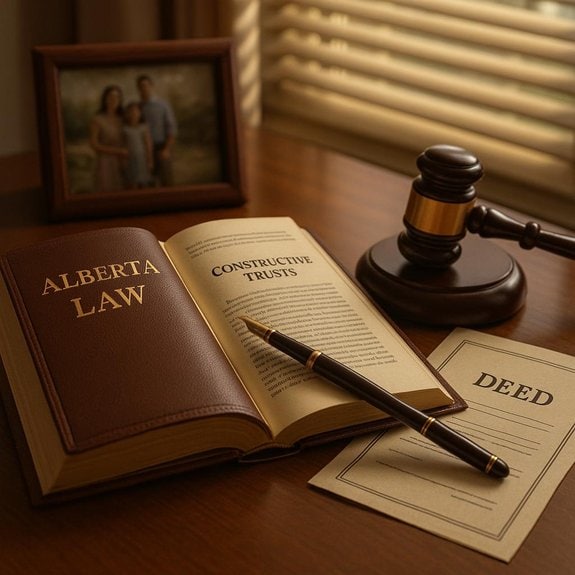
Constructive trusts in Alberta are court-imposed remedies that prevent unjust enrichment when someone holds property that rightfully belongs to another. You’ll need to prove three elements: enrichment, corresponding deprivation, and no legal justification for the enrichment. Unlike resulting trusts, constructive trusts focus on correcting injustice rather than implied intentions. They’re particularly important in family law for equitable property division. The following sections explore essential requirements and enforcement mechanisms for these powerful legal remedies.
Understanding the Fundamentals of Constructive Trusts
When examining constructive trusts in Alberta, it’s essential to understand their fundamental nature as court-imposed remedies rather than intentionally created arrangements.
Unlike express trusts, they’re not voluntarily established but imposed by courts to prevent unjust enrichment or remedy wrongful conduct.
Constructive trusts emerge not from voluntary creation but through judicial intervention to rectify injustice and wrongdoing.
You’ll encounter constructive trusts in various scenarios, including estate disputes where they can enforce mutual will agreements or address wills variation claims.
They’re also applied in cases of unjust enrichment, where someone benefits unfairly from another’s contributions to property – as demonstrated in landmark cases like Pettkus v. Becker.
Additionally, courts may impose constructive trusts for breaches of fiduciary duty, even without traditional unjust enrichment elements, as shown in Soulos v. Korkontzilas where a real estate agent’s duty breach warranted this remedy.
Legal Requirements for Establishing a Constructive Trust in Alberta
Establishing a constructive trust in Alberta requires meeting specific legal criteria that courts have developed through precedent and jurisprudence.
For your claim to succeed, you’ll need to clearly identify the property in question and demonstrate that the current owner acquired it through improper means.
You must prove either unjust enrichment or other legal grounds such as fraud, misrepresentation, or breach of fiduciary duty.
For unjust enrichment claims specifically, you’ll need to show that the defendant received a benefit, you suffered a corresponding loss, and there’s no legal justification for their enrichment.
Courts will only impose a constructive trust when monetary damages are inadequate for compensation.
Given the complexity of these claims, it’s advisable to consult with an experienced lawyer who can assess your situation and help gather appropriate evidence.
Constructive Trusts vs. Resulting Trusts: Key Distinctions
Confusion often surrounds the distinction between constructive trusts and resulting trusts in Alberta’s legal framework, despite their fundamental differences in both origin and purpose.
While both are court-imposed remedies, their applications differ considerably.
Resulting trusts arise when property is transferred without clear intention regarding beneficial ownership, creating a presumption that the transferor remains the beneficial owner. They’re based on the parties’ implied intentions.
Constructive trusts, however, are remedial in nature and imposed regardless of intention to prevent unjust enrichment or remedy wrongful conduct. They require proving a causal connection between contributions and property acquisition, and that monetary compensation wouldn’t suffice.
Unlike resulting trusts, constructive trusts don’t depend on presumed intention but focus on correcting injustice, particularly in family law and estate disputes.
Unjust Enrichment as the Foundation for Constructive Trusts
Unjust enrichment serves as the primary legal foundation upon which courts in Alberta construct the remedy of constructive trusts.
You’ll need to establish three key elements to prove unjust enrichment: an enrichment of one party, a corresponding deprivation to another, and no juristic reason for the enrichment.
In family law contexts, courts often recognize constructive trusts when one spouse’s contributions (financial or non-financial) have increased the other’s assets but aren’t reflected in legal ownership.
Similarly, in estate disputes, you might claim a constructive trust if you’ve contributed to property held by a deceased person but weren’t properly recognized in their will.
Constructive Trusts in Family Law and Property Division
Constructive trusts play a particularly significant role in Alberta family law, where they help courts achieve equitable property division beyond the restrictions of legal ownership.
When spouses separate, especially in common-law relationships where traditional matrimonial property legislation may not apply, constructive trusts become essential remedial tools.
You’ll need to demonstrate three elements to establish a constructive trust claim: enrichment of one spouse, corresponding deprivation to you, and no juristic reason for the enrichment.
Courts typically examine your contributions—financial or non-financial—to property acquisition or preservation. If you’ve contributed substantially through homemaking, childcare, or property maintenance while your partner holds legal title, you may have a valid claim.
The court will assess whether monetary compensation alone would be inadequate, making a proprietary interest through constructive trust necessary.
Estate Disputes and the Application of Constructive Trusts
When someone dies, their estate can become a battleground for disputes among beneficiaries and potential claimants, particularly when constructive trusts are involved.
Death transforms estates into contested territories where beneficiaries and claimants clash over constructive trusts and inheritance rights.
You’ll often see these claims arise when someone has contributed to the deceased’s property but isn’t adequately recognized in the will.
To successfully establish a constructive trust in an estate dispute, you must demonstrate a causal connection between your contributions and the property in question.
Courts require evidence that you suffered a corresponding deprivation while the estate was unjustly enriched.
Unlike in family law, estate constructive trusts typically require proof that monetary compensation wouldn’t sufficiently remedy the injustice.
The court maintains discretion to determine whether your circumstances warrant this powerful equitable remedy or if a monetary award would be more appropriate.
Challenging Constructive Trust Claims in Alberta Courts
Successfully challenging a constructive trust claim in Alberta courts requires a systematic approach and thorough understanding of the legal principles involved.
You’ll need to demonstrate that the elements of unjust enrichment aren’t met, or that a juristic reason exists for the enrichment.
Effective challenge strategies include proving that no causal connection exists between the claimant’s contributions and the property, showing that monetary damages would sufficiently remedy any injustice, or establishing that the claimant’s evidence lacks credibility.
In CCAA proceedings, courts are particularly reluctant to impose constructive trusts without clear evidence of fraud proven on a balance of probabilities.
Remember that courts consider broader equitable factors, including impacts on innocent third parties.
Constructive trusts are extraordinary remedies granted sparingly, especially when the property in question can’t be clearly identified.
Remedies and Enforcement of Constructive Trust Orders
Once a court has imposed a constructive trust order in Alberta, various remedies and enforcement mechanisms become available to guarantee the rightful beneficiary receives what they’re entitled to.
The court has discretion in determining the most appropriate remedy based on the specific circumstances of each case.
When enforcing a constructive trust order, you can typically pursue:
- Retitling of property to transfer legal ownership from the trustee to the rightful beneficiary
- Monetary compensation when physical transfer of the property isn’t practical or the property has been sold
- Appointment of a new trustee with specific duties to manage the property in the beneficiary’s interest
Courts won’t typically allow constructive trusts to continue indefinitely, preferring to provide definitive remedies that resolve the unjust enrichment rather than creating ongoing trust relationships.
Notable Alberta Cases Shaping Constructive Trust Law
In commercial contexts, *Long Run Exploration Ltd.* demonstrated courts’ reluctance to impose constructive trusts in CCAA proceedings without clear evidence of fraud traced to specific assets.
You’ll find that Alberta courts consistently require claimants to prove direct causal connections between contributions and property acquisition before granting this exceptional remedy.
How Vest Estate Law Can Help
When setting up constructive trusts, you need specialized legal expertise that understands Alberta’s unique trust laws.
As a boutique firm focused exclusively on estate law, Vest Estate Law provides exceptional legal services tailored to your specific situation involving constructive trust claims.
Our team can help you with:
- Evaluating potential constructive trust claims in family or estate disputes
- Representing your interests when unjust enrichment has occurred
- Steering through the complex requirements for establishing a constructive trust in Alberta courts
Working with a specialized firm like Vest means you’ll receive dedicated support throughout the estate administration process.
We’ll answer your questions and provide the guidance needed to address constructive trust matters effectively, whether you’re seeking to establish one or defending against such claims.

We currently have three offices across Alberta — Edmonton, Calgary, and Red Deer. However, we serve the entire province of Alberta. We also have the infrastructure to work with any of our clients virtually — even the furthest regions of Alberta.
Call us toll-free at 1-877-448-3131 to get routed to the best office for you or contact us online to schedule an appointment.
We also have a dedicated intake form to help you get the ball rolling. Our intake team will review your specific case and advise you on the next steps to take and what to expect moving forward.
Our offices are generally open 8:30 a.m.—5:00 p.m., Mon—Fri.


Colin Flynn
WILLS and ESTATES LAWYER
Colin is an estate lawyer practicing in the areas of Estate Litigation and Disputes. He emphasizes developing trusted relationships with his clients, ensuring they feel comfortable and at ease sharing the subtleties of their circumstances.

